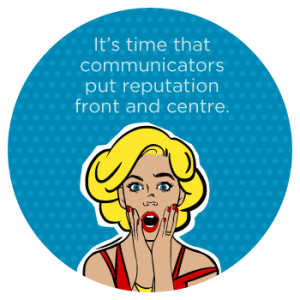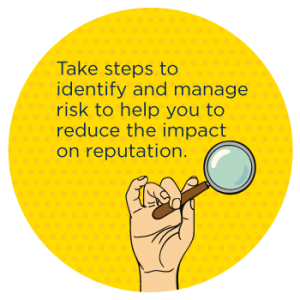From Taylor Swift to Uber, gender pay gap to GDPR, reputation keeps hitting the headlines. But what role do IC pros play in shaping and protecting reputation, not only for the organisations we work for but our industry and our own personal brands?…
Reputation is a hot topic right now. Taylor Swift wrote a whole album about it, Hollywood heavyweights watched theirs come crashing down around them in light of serious allegations. And it seems every other week there’s a story about the gender pay gap, or data breaches impacting organisations like Uber or the NHS.
And it’s those last two that should be of particular interest to internal communicators. The gender pay gap and GDPR present a huge opportunity for us to help people in our organisations understand them and do the right thing – safeguarding reputation in the process.
So, it’s time to follow Taylor’s lead and put reputation front and centre. Here are seven top tips to help you do just that. 
What’s your reputation?
It’s hard to protect a reputation if you don’t know what it is. Organisations will have an image they want to convey, but it might not be the one they have. Do some research, check sites like Glassdoor, search your company’s name on social media, chat to your marketing and client care teams, to get a good idea of what people are really saying about you.
Involve your employees
Employees are hugely important in shaping and retaining your organisation’s desired reputation, and therefore, so is internal communication. Your employees interact directly with clients and customers, and that experience informs the impression they come away with, not just that of employee but of the whole organisation. 
Ensure your employees understand the vision and values of the business, what’s expected of them, that they have tools and resources to support them, that line managers are fully trained and equipped to lead their teams and communicate effectively. And make sure employees have opportunities to share feedback and ideas – they have the first-hand experience of the customer and their insight can be incredibly valuable.
Know your stuff
If you’re going to help protect your organisation’s reputation, you also need to work on your own reputation as a credible communicator. Be the trusted adviser your senior leaders need by always thinking ahead, anticipating potential outcomes and really understanding key business topics.
Find out what’s important to your senior leaders, do research and ask questions at the appropriate time. Asking if GDPR will matter post-Brexit is fine at the initial planning meeting where everyone’s trying to get their head around the new regulation, but asking when you’re writing the FAQs a week before your campaign begins, not so much. More than ever, it’s essential we look beyond our own discipline and understand the business of business.
Find the positives
GDPR is ultimately about behavioural change from an IC perspective. You’re asking employees to understand and act upon the information you’re providing to avoid fines and safeguard reputation.
However, when trying to demonstrate the seriousness of it all, it’s easy to terrify them to their core with tales of €20 million fines. And chances are they’ll bury their heads in the sand, presenting a major reputational risk.
While employees need to know the consequences, don’t forget to look for the positives. For example, GDPR benefits all of us by keeping our information more secure and it creates a level playing field as all organisations doing business in Europe have to comply with the same regulation.
Perception vs reality
Often there is a chasm between the perception people have of an organisation and the reality of actually working there. If your people are disillusioned, it will be a matter of time until it starts to seep through into your external reputation. Glassdoor and social media can make for sobering reading for many companies, staff turnover figures might feature in your annual report, and clients will start to complain that standards are slipping.
For the perception to become the reality, organisations need to truly live their values and create an employee experience that encourages an engaged workforce. We have a responsibility to challenge senior teams and peers and to champion honest and authentic communication that supports a reputation based on reality.
Do what you say you will, when you say you will
Reputation is intrinsically linked with trust. So, be realistic in what you promise, set the correct expectation and absolutely deliver on it. A good reputation can be ruined in minutes by simply failing to meet a deadline. People will understand when there are unforeseen circumstances beyond your control, but they will form an opinion on how you deal with it.
Calculate risk
A good project management practice to get into is to calculate risk on bigger pieces of communication. If you’re running an engagement survey for example, there could be a risk the technology will fail, or that leadership won’t want to hear the feedback, let alone act on it. Risks like these can impact the reputation of the internal comms team, the leadership team and by extension the organisation.
Taking steps to identify and manage risk can help you to reduce the impact on reputation – and again demonstrates to leadership that you think strategically, reinforcing your credibility and reputation as an internal communicator.
It’s time to make sure reputation is hitting the headlines for all the right reasons. And we have an important part to play in doing that.
Topics like GDPR can seem complicated and onerous, but as an industry that’s looking to prove its credibility, it’s an opportunity served on a silver platter. We should be seizing it with both hands.
By Helen Deverell for Alive!
















